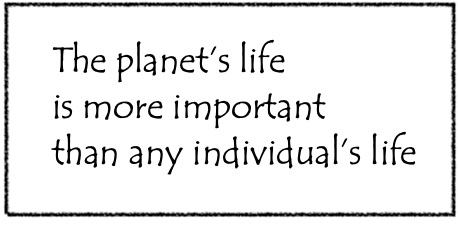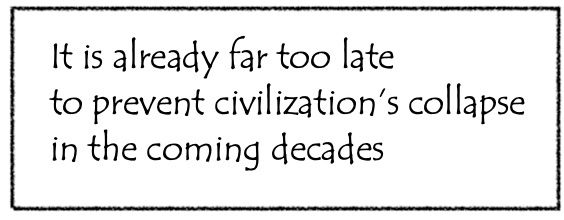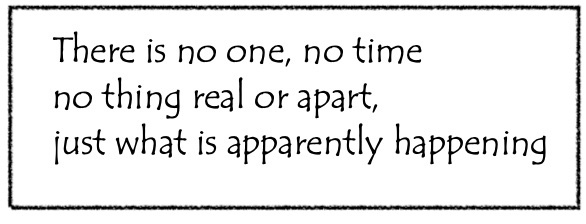Every day, I shift back and forth between three ‘personas’, completely incompatible systems of belief, worldviews and ways of trying to make sense of the world. One writes:

This ‘Dave’ believes there will come a time, probably in about ten years, when I will be ready to sacrifice my life to defend this planet. Whether this entails attempting to ‘block, break, or take’ the tools of its destruction, and regardless of how hopeless and useless I may know my personal direct action to be, I will act.
Meanwhile, a second ‘Dave’ writes:

This second Dave is not outraged by collapse, but equanimous about it. He thinks the first Dave is bone-headed for risking his life to achieve an impossible goal, or even getting pointlessly worked up about it. The first Dave thinks the second is disconnected and in denial of his true feelings, his grief and shame and rage, and is giving up, and hence disappointing colleagues and letting down all life on earth.
And then there is a third ‘Dave’ who writes:

This third Dave doesn’t think Dave has any free will, and more than that, doesn’t believe Dave, and Dave’s ‘reality’, is anything more than a construct of the brain. He believes all there is is ‘what is apparently happening’, neither ‘real’ nor ‘unreal’, just ‘apparent’. So he believes there is no planet, no life, no individual, no civilization, no collapse, and no time, not ‘really’, and that hence the beliefs of the other two Daves are based on illusions and therefore quite absurd, akin to believing that action must be taken to correct something that happened in a dream, or that there needs to be a serious coming-to-grips with what was learned in a dream.
The first and second Daves are completely puzzled by the third Dave, and worry that he might be dissociating because the anxiety, grief and shame about collapse are just too hard to bear.
But for the most part the three Daves have little to say about each other, because they live in different worlds. As readily as they appear to take turns occupying this body and typing the words in this blog, they are not simultaneous.
I go back and read the three articles linked above, and they all seem evocative, interesting, compelling, and earnest. As I read them I nod and say to myself: Yes, yes, and yes.
They are completely incompatible. Can they all be ‘right’, whatever that means?
The first Dave’s message feels right. The second Dave’s message seems logically and rationally right. The third Dave’s message has been seen, during so-called ‘glimpses’, to be obviously right, and continues to seem intuitively right at some deep level.
For some people, I think the cognitive dissonance of all this would be just too much to handle, and suspect they would jettison two of the three incompatible views. As Euan Semple recently wrote, being at war with yourself is a losing battle.
I have learned, somewhat begrudgingly, to live comfortably with uncertainty and ambiguity, and the endless cognitive dissonance. I’m not even sure there is a ‘right’, and I’m not perturbed that this weary little body I presume to inhabit, with its insatiable curiosity, its ever-doubting nature, and its passion to know how the world really works, and to decide if that’s OK or not, seems further and further away from coming to any conclusion or understanding.
I have a sense that, if I were able, for just a few moments, to change places with a bird, all of the confusion would be gone. Barring that, I’m growing content with never knowing, with acknowledging more and more often that I don’t know, and just trying to cultivate a sense of wonder about it all.





Cracking post, and if it’s any comfort I too have various, incompatible selves, but err increasingly towards the third one.
Easy to solve the (apparent) confusion of such 3 (mutually exclusive) states in (some kind of quantum) superposition in the same brain.
Poke the superposition state with a stick and the individual states happen all at once or maybe nothing happens.
Maybe each state pops up in it’s own universe or maybe not.
In the first case no need to worry about cognitive dissonance.
In the second case , poke harder until the first situation happens or just leave it alone and don’t give it another thought.
Whatever you do or whatever happens, or not, the problem is solved.
Maybe it wasn’t even a problem to start with.
If all this sounds a bit sarcastic, maybe it is.
Waiting 10 years for the opportunity to put your life on the line for “the planet” seems a bit optimistic to me.
News from the around the world is rapidly going from bad to worse: Floods, droughts, famines, deadly heat waves, widespread shortages of food, water and energy, and yes, war. The forecast from the Limits to Growth report, first published 50 years ago now, appears to be right on schedule.
If you aren’t passionate enough about it to do something now, say, for example, self-immolating in front of the Supreme Court, then “First Dave” might as well just zip his lip and find something else to do, in my not-so-humble opinion.
“Third Dave” probably has the best idea, a little harmless navel-gazing to take ones mind off of all the doom n’ gloom, if you can afford that luxury.
I do believe I relate to the dissonance, and the last two articles appearing on this blog seemed written by someone who believes in free will and choice.
I am with you.
Outrage seems important and, in some sense, worthwhile, but it also seems important to acknowledge that ‘outrage’ is always kind of impotent and feckless in a situation (life) that was always-already headed toward the doom we rail against.
Perhaps it is ‘too late’ to prevent civilization’s collapse because civilization itself was already the sign of the collapse of some prior structure that gave birth to it. Whether it comes to any “individual” civilization or the macro-phenomenon of civilization ‘in general’ – wasn’t civilization always going to end? Aren’t we ultimately just as in control of our end as we were in control of our beginning (i.e., not at all)?
If every phenomenon is complex, contradictory, and fleeting, what is there to do other than be the witness? Love what we can, while we can, however we can, accepting all the mistakes, inconsistencies, blind spots that come with love (whatever that even is), and let the rest go because it’s not up to us?
No selves anywhere, just time in its unfolding contradictory moment of eternity….
Thanks for the thoughtful, actually rather poetic, responses to this.
Here’s the blurb from one of the best collapse books I’ve read.
Immoderate Greatness Why Civilizations Fail
William Ophuls
“Immoderate Greatness explains how a civilization’s very magnitude conspires against it to cause downfall. Civilizations are hard-wired for self-destruction. They travel an arc from initial success to terminal decay and ultimate collapse due to intrinsic, inescapable biophysical limits combined with an inexorable trend toward moral decay and practical failure. Because our own civilization is global, its collapse will also be global, as well as uniquely devastating owing to the immensity of its population, complexity, and consumption. To avoid the common fate of all past civilizations will require a radical change in our ethos—to wit, the deliberate renunciation of greatness—lest we precipitate a dark age in which the arts and adornments of civilization are partially or completely lost. “
https://b-ok.cc/book/2769717/7a0f57
That long back road in life is really an interesting adventure, isn’t it, Dave?
I’ve taken one for the last twenty five years as well.
Is it a Christian idea for you? It probably has been for me.
The “long back road” is a great expression; it might even work as the “long road back” (to simple childhood wonder). Not religious or spiritual at all for me, though it’s interesting to see that Paul Kingsnorth has taken that route. I have been both genetically and culturally conditioned to challenge everything I believe (my father was the same way).
I think Kameron is right in saying the best we can hope for is to be a good witness to what is (apparently) happening. That long back road is pretty thorny, though, and requires much better attention skills than I have demonstrated so far.